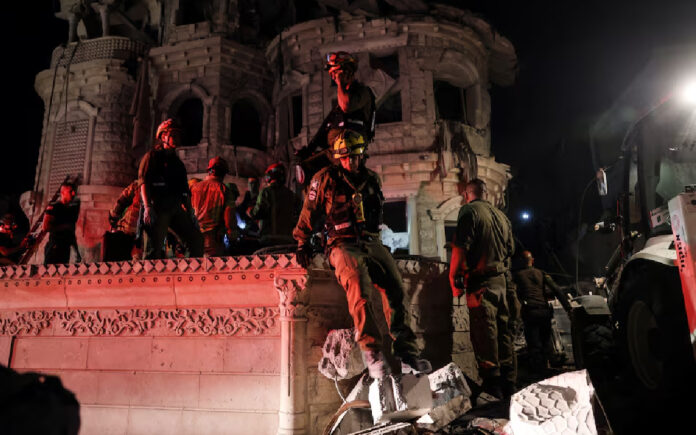Tel Aviv/Tehran: Israel and Iran have launched a fresh wave of attacks on each other, heightening fears of a full-scale regional war, following an Israeli strike on the South Pars gas field— the world’s largest— in Iran. The confrontation has triggered alarm across the Middle East and brought an abrupt halt to U.S.-mediated nuclear talks.
Iran announced the suspension of the nuclear negotiations slated for Sunday in Oman, stating the talks were untenable while Israel continued what it described as “barbarous” attacks. Meanwhile, Israeli Prime Minister Benjamin Netanyahu declared that the current strikes were only a fraction of what Iran could expect in the coming days.
The latest Iranian assault began around 11:00 p.m. local time on Saturday (2000 GMT), setting off air raid sirens in Jerusalem and Haifa. Panic swept through the cities as nearly a million residents rushed into bomb shelters. At approximately 2:30 a.m. (2330 GMT), Israel’s military issued another alert for incoming missiles, urging citizens to take cover. Explosions rocked Tel Aviv and Jerusalem as interceptor rockets launched into the sky. The military lifted its shelter-in-place order roughly an hour later.
Israeli emergency services confirmed at least seven fatalities overnight, including a 10-year-old boy and a woman in her 20s. More than 140 people were reported injured across multiple sites. Search and rescue operations continued through the night, as crews used dogs and flashlights to locate survivors trapped beneath rubble.
A missile strike on an eight-storey residential building in Bat Yam, just south of Tel Aviv, left at least 35 people missing, according to Israeli media. Emergency services confirmed multiple casualties, though the total number of buildings struck overnight remains unclear. Since Friday, nine Israelis have been confirmed dead, with more than 300 injured as Iran continues its retaliation.
In Tehran, authorities reported that 78 people were killed during the initial Israeli strikes, with dozens more dead on the second day, including 29 children when a missile destroyed a 14-storey apartment building. Iran also confirmed that the Shahran oil depot was hit in one of the attacks, though officials said the resulting fire was contained. The semi-official Tasnim news agency added that Israeli missiles had struck near Iran’s defense ministry, causing only minor damage.
Iran’s South Pars gas field in Bushehr province was partially shut down after sustaining damage from an Israeli missile strike that caused a fire, marking the first known hit to Iran’s energy infrastructure. The field supplies the majority of Iran’s domestic gas.
Markets reacted sharply to the rising tensions, with oil prices surging by 9% on Friday. Despite sparing Iran’s oil facilities initially, the targeting of South Pars has intensified fears of a disruption to global energy supplies.
Iranian Brigadier General Esmail Kosari stated that Tehran was reconsidering the closure of the Strait of Hormuz— a strategic chokepoint for global oil shipments. The prospect of such an action has further stoked concerns about a broader regional escalation.
While Netanyahu called on Iranians to rise against their clerical leadership, he also warned that Israel’s military operations could extend over several weeks. In response, Tehran issued warnings to Israel’s allies in the region, cautioning that any support in intercepting Iranian missiles would result in their military installations being targeted as well.
B’Tselem, a prominent Israeli human rights organization, criticized the Israeli government’s approach, saying: “Instead of exhausting all possibilities for a diplomatic resolution, Israel’s government had chosen to start a war that puts the entire region in danger.”
Iran’s ability to rely on regional proxies has diminished significantly due to the toll of previous conflicts. Hamas in Gaza and Hezbollah in Lebanon— considered Iran’s primary allies— have suffered major losses over the past 20 months, curbing Tehran’s retaliatory options.
Israel maintains that Iran’s nuclear program poses an existential threat and claims its current bombardment is aimed at stopping Iran from acquiring a nuclear weapon. Iran, however, continues to assert that its nuclear activities are purely civilian. The International Atomic Energy Agency (IAEA) recently reported that Tehran is in violation of several obligations under the global non-proliferation treaty.



